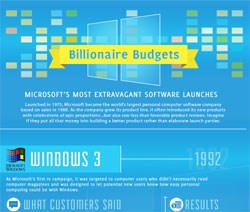Microsoft's billionaire budgets (& extravagant launches)
Nearly nearly 62% of the world's computers running some version of the operating system (OS). Microsoft's dominance of the global computing scene is due in no small part to its now-legendary campaigns celebrating the launch of each new version of Windows.
Beginning with the launch of Windows 95, the company has shown a commitment to spectacle that rivals (or perhaps, as some critics grumble, exceeds) its commitment to software. Yet even amid increasingly harsh criticisms about rushed production, security flaws and compatibility issues, Windows has continued to expand its market share-and its marketing budget. Launched back in 1992, Windows 3 managed to transform personal computing for millions of people (to the tune of $1.1trn over the first two years of sales), but its paltry $8m marketing campaign probably wouldn't cover appearance fees for even one of the company's celeb-packed adverts for Windows Phone 8-a product with a potentially ephemeral lifespan - in 2012.
Breaking the billion dollar barrier
With Windows 8, Microsoft officially broke the billion-dollar marketing barrier (and nearly broke the $2bn barrier), combining its software launch with the debut of new hardware (its Surface tablet). Hailed as the biggest product launch in the history of the computer industry, Windows 8 premiered after an estimated 1.24 billion hours of public beta testing. The company subsequently raked in $16bn in revenue over the next six months, but with launch marketing consuming 11.2% of those dollars, the law of diminishing returns seems to have reared its misshapen head.
Regardless of its missteps along the way, Microsoft's intention to continue its domination of the personal computing marketplace is clear. But with the rise of mobile computing and the increasing importance of smartphones and tablets, the company that trotted out the Rolling Stones to "start us up" back in 1995 will need more than spectacle to see that intention through.





